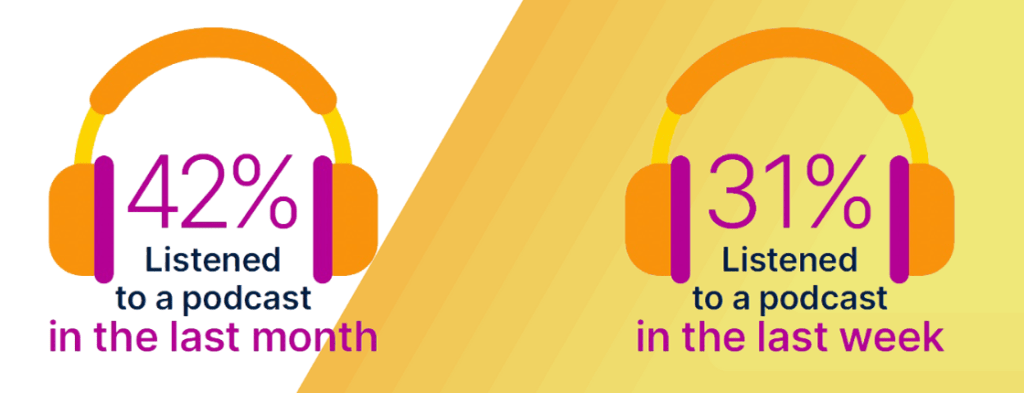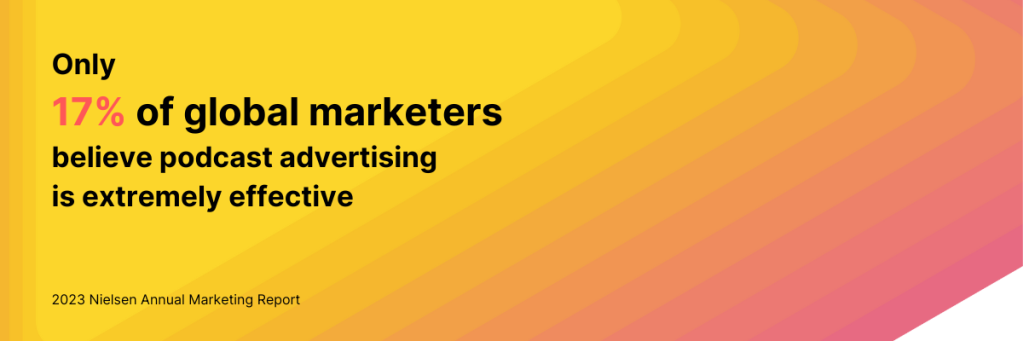Now emerged from a period of exponential growth and business investment, the podcast industry is in a similar place as the streaming industry: rife with content and focused on long-term business sustainability. Among audiences, podcasts, like video streaming content, have never been more popular. But the massive catalog of titles can make it difficult for advertisers to decide which ones to partner with—and how to evaluate their returns.
The challenge is real. According to data from podcast search engine Listen Notes, audiences now have more than 3.1 million podcast titles to choose from. That’s more choice than they have across linear TV and streaming services combined1. Vast choice notwithstanding, podcast engagement continues to rise, as the number of Americans listening has increased by 45% in the last five years2.

In addition to a larger listener base, audiences are listening more than they have in the past. That can be attributed to both the increased awareness of podcasts and the fact that many consumers have returned to physical offices, which requires a commute. In fact, in-car/while in public transportation is now the most popular place to listen to podcasts among people 18-34 and 35-493.
The rising engagement with podcasts is a clear signal of the opportunity for brands. When you complement that engagement with the fact that podcast ads can boost brand awareness by 13 percentage points4, the upside is even brighter. Knowing how to achieve that potential, however, is where the challenge often lies, simply because measuring the effectiveness of ads in newer media is different from measuring ad effectiveness in traditional media.
For example, we reported in our 2023 Nielsen Annual Marketing Report that 54% of global marketers plan to raise their spending on podcast advertising in the coming year (in North America, the percentage is 66%). They’re not alone, as the most recent podcast ad revenue forecast from the IAB suggests that the amount could more than double over the next four years, hitting approximately $4 billion by 2025. The downside of that growth, however, is a lack of confidence in knowing if the spending is doing its job. Only 49% of the marketers surveyed for this year’s marketing report said they are either extremely or very confident in their ability to measure the ROI of their podcast advertising. That’s the lowest level of confidence across digital channels5.

The knowledge gap between understanding the potential of podcasts as a marketing channel and how to capitalize on it highlights why marketers don’t view it as very effective. The good news is that Nielsen has identified the five drivers of brand lift for podcast advertising, as well as how much weight they each carry in driving lift. For podcast advertising, brand recall is the biggest driver of brand lift, followed by enjoyability and how captivating the creative is.
Importantly, the influence of these brand lift drivers varies from industry to industry. While brand recall is the biggest driver of lift from an average perspective, for example, it’s far less influential in financial services and consumer packaged goods. For those industries, having a higher baseline awareness (i.e., familiarity without any ad exposures) is much more important, complemented by ads that are relatable and enjoyable. For auto brands, being captivating is the most influential.
At a more granular level, these five attributes have different effects on specific key performance indicators, such as affinity, brand familiarity and recommendation intent. And when it comes to purchase intent, enjoyability rises to the top across podcast advertising.
Among marketers, brand building and new customer acquisition remain top priorities—priorities that depend on understanding how their ads affect brand lift. Somewhat surprisingly, research from Christine Moorman, who oversees the annual CMO Survey, highlights that only 3% of marketers measure brand equity consistently.
You can’t manage what you don’t measure. Marketers will remain unable to assess brand equity if they don’t track it. And we know from recent years that the media industry will continue to welcome new platforms, channels and services to engage content-hungry audiences. And now, with insight into what drives brand lift in podcast advertising, advertisers and agencies have a clear blueprint for measuring brand equity—and how to improve it.
For additional insights about brand lift drivers in emerging media, download our 5 brand building factors for emerging media report.
Sources
1Per Gracenote Video Data, audiences across the U.S., U.K., Canada, Mexico and Germany now have more than 2.7 million individual video titles to choose from.
2Edison Research; “Infinite Dial,” 2023; P12+.
3Nielsen Scarborough Podcast Buying Power, May 2023
4Nielsen Podcast Brand Impact norms database, Q2 2023
5Digital channels include email, search, social media, native advertising, online display, online video, CTV, streaming audio and podcasts.



